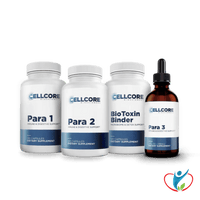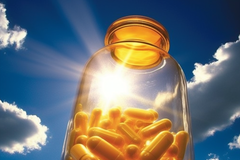Purpose
Potassium is an electrolyte. Electrolytes are substances that when dissolved in water create a positive charge. Also, electrolytes are necessary to keep balance within the body and are often included in sports drinks for performance. What is potassium's role in the body though?
Potassium has a role in:
- Blood pressure
- Normal water balance
- Muscle contractions
- Nerve impulses
- Digestion
- Heart rhythm
- pH balance (acidity and alkalinity)
Recommended Daily Intake
Consuming the appropriate amount of potassium is important in one's diet/supplementation because too little can have negative effects and too much can also have negative effects. Find the right amount for you in the chart below.
| Female | Male | Pregnant | Breastfeeding | |
| Birth to 6 months | 400 mg | 400 mg | - | - |
| Infants 7-12 months | 860 mg | 860 mg | - | - |
| Children 1-3 years | 2,000 mg | 2,000 mg | - | - |
| Children 4-8 years | 2,300 mg | 2,300 mg | - | - |
| Children 9-13 years | 2,300 mg | 2,500 mg | - | - |
| Teens 14-18 years | 2,300 mg | 3,000 mg | 2,600 mg | 2,500 mg |
| Adults |
2,600 mg |
3,400 mg | 2,900 mg | 2,800 mg |
Signs and Symptoms of Deficiency
If you are low on potassium, you may experience some symptoms such as:
- Extreme fatigue
- Muscle spasms, weakness, or cramping
- Irregular heartbeat
- Constipation, nausea, or vomiting
Issues other than potassium deficiency may also cause these symptoms but if you experience these things and are low on potassium, adjusting the amount you are consuming could minimize these symptoms or help determine if something besides potassium deficiency is going on.
Food Sources
Bananas come to mind when searching for a source of potassium, but there are many other options to include in your diet if you want to improve your intake of potassium. You can find potassium in:- Fruits, such as avocados, organic dried apricots, pomegranate, organic prunes, organic raisins, coconut water, organic orange juice, and organic bananas
- Vegetables, such as swiss chard, acorn squash, organic potatoes, sweet potatoes, organic spinach, beets, organic tomatoes, and broccoli
- Lima beans, peas, lentils, kidney beans, and organic sprouted nuts
- Grass-fed milk and yogurt
- Pasture-raised meats and wild-caught fish
Healthy Beings Strategies to Address Deficiency
Healthy Beings offers supplements and services that can mitigate and address deficiencies you might be struggling with. We also offer recommendations beyond our current available inventory. You will find suggestions below that can help prevent a deficiency. If you are not sure if you have a deficiency, contact us HERE and we will answer questions you might have.
Maintain Optimal Potassium Levels!
Sources
1. https://www.healthline.com/health/potassium2. https://ods.od.nih.gov/factsheets/Potassium-Consumer/












